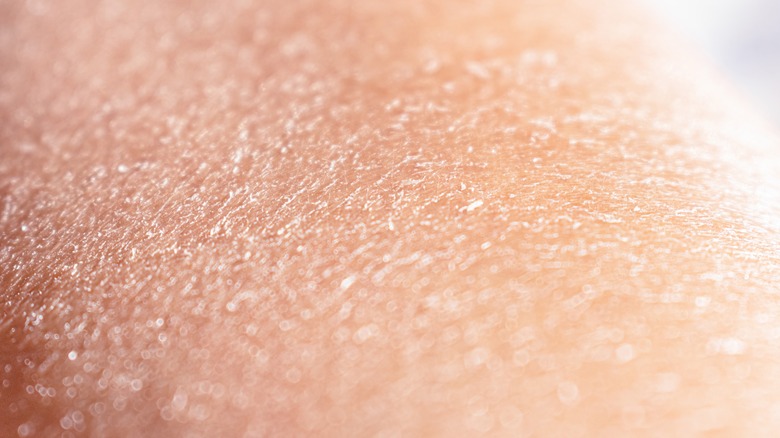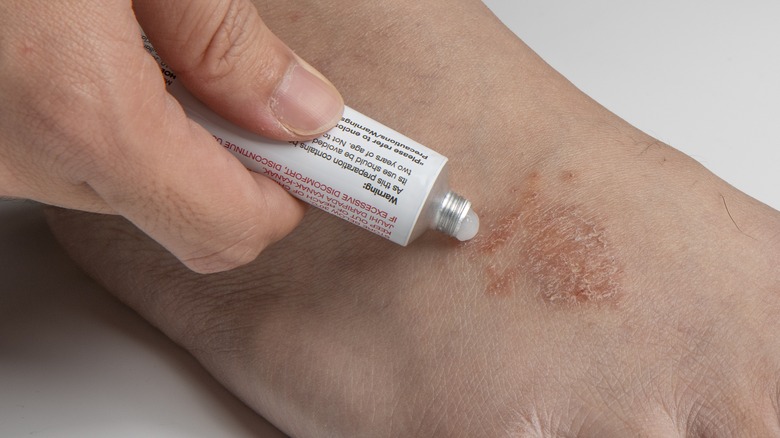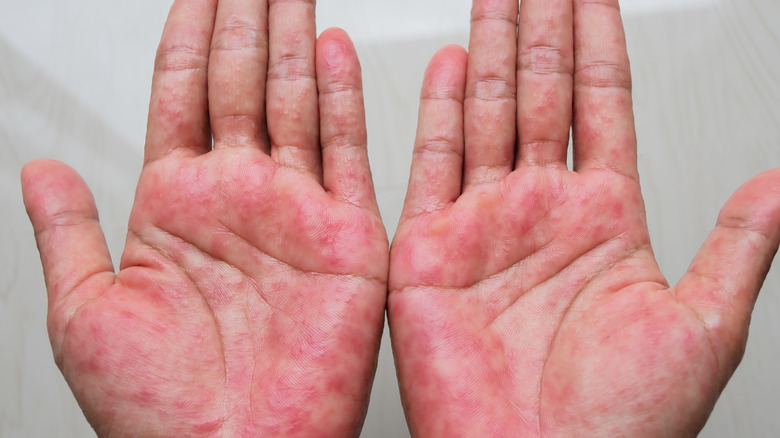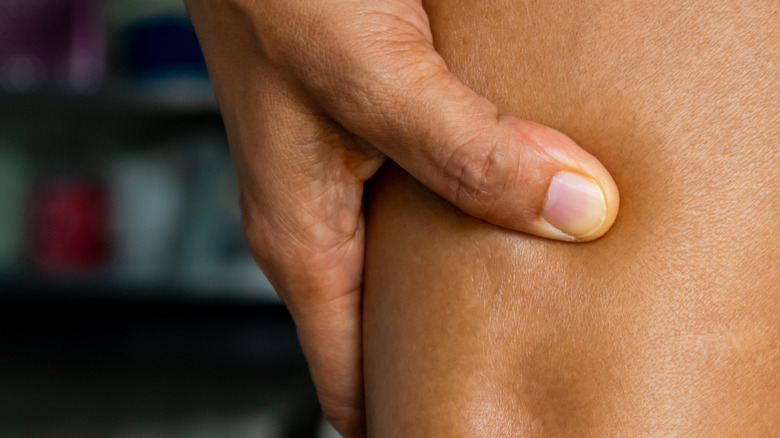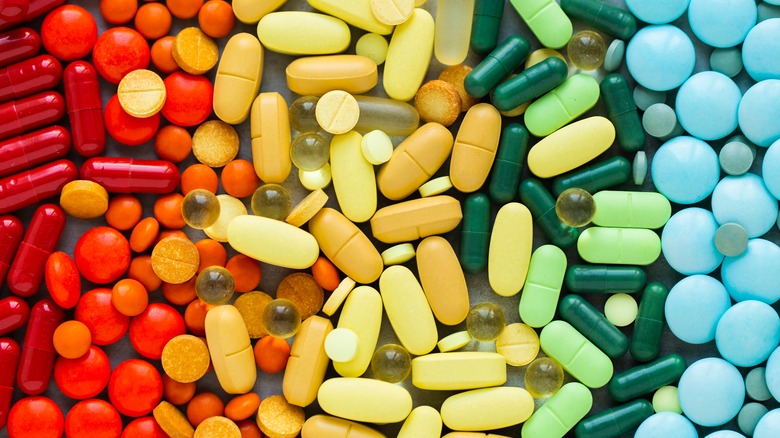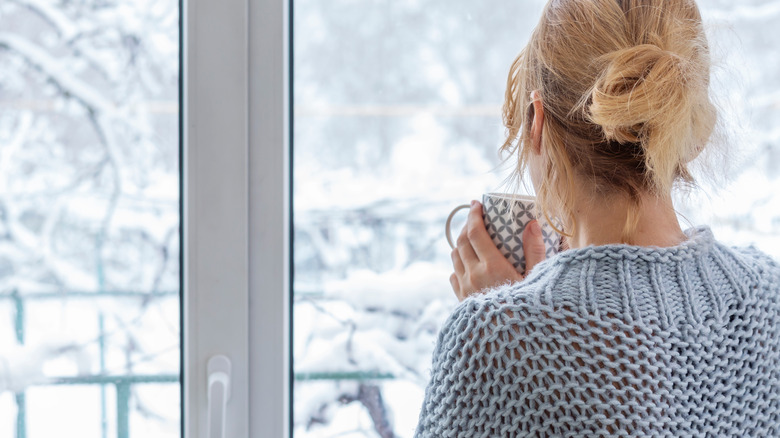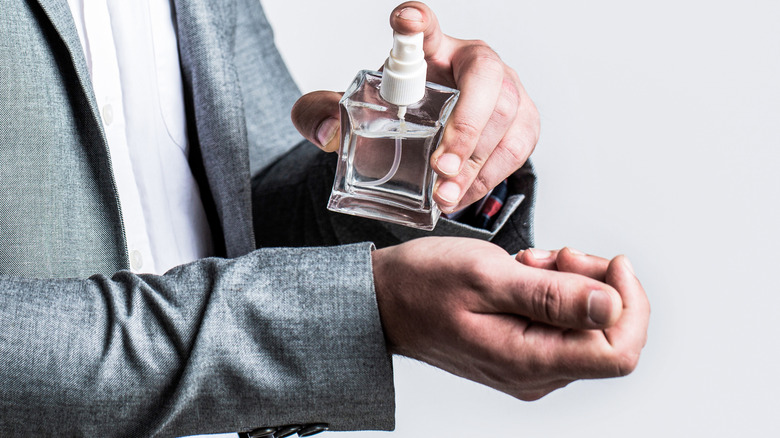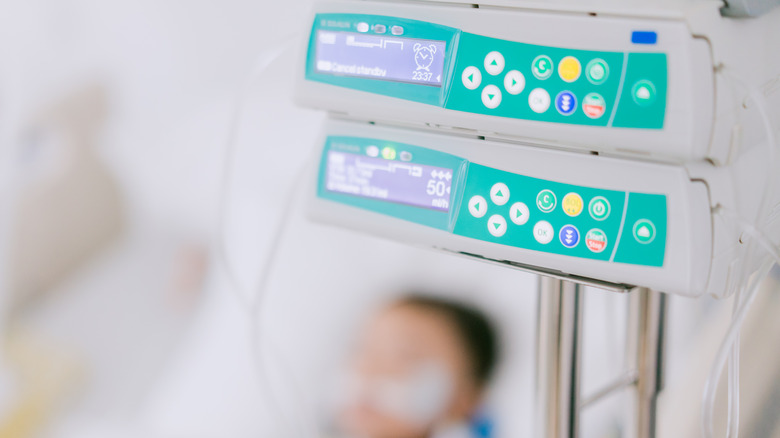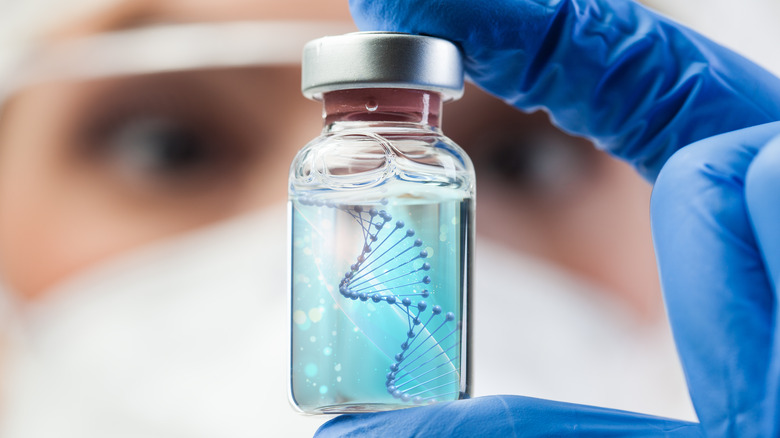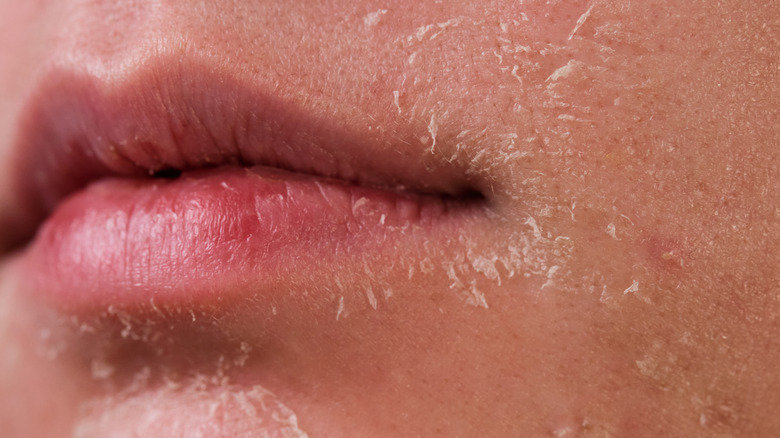13 Causes Of Peeling Skin You Might Not Know
Our skin goes through a lot. The largest organ in (or, potentially more accurately, on) our bodies, our skin acts as the rest of our system's protection from the outside world, according to the Cleveland Clinic. Composed of our epidermis, dermis, and hypodermis — distinct layers that all serve different functions — the skin we're in serves as a bed for our hair, keeps germs and bacteria from entering our system, and ensures that we remain at the right body temperature.
With that said, while the skin does a lot, it's far from invincible. And now and again, things can start to get a little... flaky.
Caused by damage to the epidermis (per WebMD), peeling skin is a rather common thing that people have to deal with, and at times, it can be quite annoying to deal with. Yet sometimes, peeling skin can be a sign of something much larger at play — and what's fairly frustrating is it can be caused by a lot of different things, with some of them being pretty out there. So if you're wondering why your skin is starting to feel a little peel-y, let's take a look at the things that could be causing it.
Fungal infections may prompt your skin to peel
Oftentimes, peeling skin is a symptom of something else entirely. And that thing, unfortunately, may be a fungal infection.
Common fungal infections like athlete's foot, jock itch, and ringworm all tend to provoke skin peeling, according to Medical News Today. Other symptoms related to your skin are also common, with cracked skin or itching being a frequent occurrence (such as blistering, discoloration, irritation, or a raised ring-shaped area of skin in the case of ringworm).
It's worth bearing in mind that a lot of the time, fungal infections are contagious, with ringworm in particular being very capable of spreading from person to person through skin contact. Thus, don't assume that peeling skin isn't a big deal. The good news, though, is that fungal infections are generally pretty mild overall, and can be cleared up with a short course of treatment from your doctor. But if you suspect you have a fungal infection, you should speak to a healthcare professional immediately: They won't go away on their own, and are likely to only get worse if you leave them untreated.
Your skin may peel thanks to contact dermatitis
Eczema affects around 10% of all people, with well over 31 million individuals in the U.S. experiencing the skin condition (per the National Eczema Association). And a type of eczema, known as contact dermatitis, may be behind your skin peeling, as the Mayo Clinic states.
Contact dermatitis occurs when you touch something that triggers eczema symptoms. Aside from your skin peeling, you may also experience dryness, blistering, or itchiness (per the NHS). Your skin may also change in appearance, turning a different color in the area that's been affected, with symptoms appearing anywhere from a few hours to a few days after exposure to whatever irritated you.
If you have contact dermatitis, the best course of action is prevention, in order to avoid triggering your peeling skin and other symptoms. However, if that's not possible, it's useful to react as quickly as possible, cleaning the affected area and applying emollient creams or lotions to keep your skin well hydrated and prevent drying and peeling. For more profound symptoms, your doctor might prescribe topical corticosteroids, again in the form of a cream or ointment.
Watch out for sunburn
The first days of summer, when the sun rises high in the sky and draws us all out of our homes, are nothing but a joy. But all of that time in the sun won't do your skin any favors, folks.
Sunburn occurs "after a body's defenses are overwhelmed by too much exposure to this UV light," according to Nashville-based board-certified dermatologist Natalie Curcio (via the Skin Cancer Foundation). Both first- and second-degree sunburns, the latter of which are far more serious, will result in skin peeling, a process that happens due to your body trying to shed the cells that have been damaged by the burn.
The first thing you need to do when you notice this happening is to prevent any further sun damage, ideally by staying in the shade for a while. Then, just let your skin do its thing. "Do not pull off your peeling skin, and avoid active exfoliation. Instead, allow it to slough off your body on its own," says Curcio. This will usually take around a week, during which you need to keep your skin moist and well protected, to expedite the healing process.
Edema can cause peeling skin
We all hold fluid to some extent in our bodies — after all, we're made mostly of water, and when you drink it, you don't pee it out immediately, do ya? — but some folks retain more than others. And when people experience edema (fluid retention that leads to swelling often observed in their limbs), peeling skin can be a symptom, according to WebMD. Generally, your skin will see its biggest change when your swelling goes down: As the fluids leave your limbs or other body parts, your skin responds by shedding its outer layer.
Edema can be caused by a host of underlying factors, from medication you're taking to longer-term conditions like liver or kidney disease. It can even be prompted by things as simple as staying upright for too long, causing fluid to pool in your lower extremities, or eating too much salt (so now you know why you feel so puffy after a particularly sodium-rich meal), says the American Academy of Family Physicians. Remember, though, you can't treat edema as a symptom in itself and expect it to go away forever – instead, you need to establish the root cause, and address that first.
Certain types of medicine may make your skin dry out and peel
While modern medicine is one of the true wonders of the world, you'd be hard-pressed to find a medication that doesn't carry any potential for side effects, no matter how small or unnoticeable. And peeling skin can be a byproduct of a surprisingly wide range of medications, as Single Care points out.
This generally happens because the medicine you're taking is drying out your skin, which then results in your upper layer of skin starting to peel away. One medication that can prompt this is statins, a form of medicine prescribed to treat high blood pressure, as pharmacist Nonye Uddoh says. Statins, which you might find under names like Lescol, Lipitor, or Zocor, change your skin to make it more porous (and therefore more susceptible to losing moisture).
Other medications cause you to lose moisture in different ways, such as through your bladder, in the case of diuretics. That diuretic effect prompts your skin to dry out faster, resulting in peeling. "Other medications that can cause dry skin include antihistamines like Benadryl," warns Uddoh, attributing it to their ability to inhibit naturally-made oils from your skin, which can potentially cause long-term problems.
Peeling skin may be prompted by toxic epidermal necrolysis
A lot of the time, skin peeling is pretty minor, and can be addressed quickly by dealing with the root cause. But sometimes, your skin may peel in way more extreme a manner. This is the case with individuals who experience a condition called toxic epidermal necrolysis, a potentially deadly skin disorder that causes drastic skin peeling (via Johns Hopkins Medicine). People who have toxic epidermal necrolysis may experience large portions of their skin peeling off, leaving them with exposed, raw areas that are highly susceptible to infection and fluid loss.
Toxic epidermal necrolysis may be prompted by an adverse reaction to medications like antibiotics, and once it manifests, it will develop quickly. If you notice any symptoms of the condition (which can include fever or a sense of general discomfort), you must seek medical attention immediately. Your course of medication may be discontinued, and your doctors will focus on trying to prevent further damage to the skin and reducing the risk of infection. Also known as Stevens-Johnson syndrome when it has less severe symptoms, toxic epidermal necrolysis can present a host of long-term health issues, like hair loss, abnormal sweating, or changes to taste and urinary habits, says MedlinePlus.
It may just be because of the environment you're in
Peeling skin is often prompted by something that's happening internally, but it can equally be caused by something that's happening outside — quite literally. And if you find yourself in an area that's especially humid, hot, windy, or dry (yes, we know that doesn't leave many other options!), that could be the reason behind your peeling skin, says the Mayo Clinic.
Skin can be particularly susceptible to colder temperatures. "Typically, in the winter months, skin becomes more dehydrated and sensitive because, in cold weather, there's less humidity in the air, plus we're usually hanging out in dry, heated environments," explains American Academy of Dermatology fellow and board-certified dermatologist Shari Hicks-Graham (via SELF). This causes our skin to lose moisture that isn't replaced by our environment, and once it dries out, it can peel away.
When it's particularly cold out, it's useful to take preventive measures to keep your skin as hydrated as it can be. Try and create a barrier between your skin and the harsh, cold air by wearing gloves or long-sleeved clothing and wrapping up warm. You can also use a humidifier in your home to replenish the lost moisture in the air.
Your peeling skin might be the result of a perfume allergy
There are few things more pleasing than throwing on your favorite scent before you head out for the night, and those times of the year when we start to experiment with new smells are pretty thrilling, if you ask us (hey, we like perfume, what can we say?). But be careful when you're trying out that brand-new fragrance, as now and again, your skin can get a little, shall we say, resistant.
Perfume allergies are pretty common, with almost a third of the U.S. population experiencing irritation after applying a scent (via Healthline). And when you trigger an allergic reaction from perfume, your skin can become dry or scaly, or even start to peel.
It's worth bearing in mind that a reaction from applying perfume isn't always an allergy. Some people may simply be sensitive to a substance included in the perfume, and experience milder symptoms that will fade relatively quickly. If you do have a perfume allergy, though, you should remember that reactions can occasionally be severe, with swelling around the oral cavity and anaphylaxis being especially dangerous and potentially life-threatening. If you experience any significant symptoms after applying perfume, contact a healthcare provider immediately, and above all, stop using it.
Kawasaki disease can have peeling skin as a symptom
While it's important to watch out for peeling skin as a symptom in yourself, it's also important to look out for it in other people. And if you have children, keeping an eye on their skin health is vital, as it may be a clue to a more profound health condition. Kawasaki disease is one condition you should definitely be looking out for. It has peeling skin as a symptom, especially on the hands and feet, both on their insides and outsides (per the NHS).
It's important to note, however, that peeling skin is a later-stage symptom of the disease, and you'll likely be aware of its presence before then, as indicators like swollen lymph nodes, a high fever, and a rash will all precede it. While the causes of Kawasaki disease remain somewhat elusive, it's believed that a genetic predisposition makes children more likely to experience it. You must seek treatment for the condition immediately, though: Although it's possible to recover from it fully, taking too long to address the disease may result in serious cardiovascular complications and cause subsequent, ongoing problems.
Sometimes, what you put on your skin to treat other conditions may prompt peeling
You'd be hard-pressed to find someone who hasn't experienced a bout of acne at some point in their life, with up to 95% of people having the skin condition during adolescence and up to half of all adults over 25 going through some form of acne (per research published in JAMA Dermatology). But if your acne is such that you're using treatment to tackle it, you might find your skin reacting differently.
Acne treatments that use retinol as an active ingredient can make your skin peel, says WebMD, especially during the early stages as it adapts to the substance. If you're using Accutane to treat your acne, this may also prompt skin changes, and while dry lips are a frequent side effect, "[d]ryness of the rest of the skin surface and other mucous membranes is also frequently seen although not in 100% of patients," says Connecticut-based dermatologist Robin Evans (via Single Care).
While dryness and skin peeling is to be expected, if it becomes a significant issue, it may be worth discussing your options for treatment with a dermatologist.
Cancer treatments can prompt skin peeling
Having cancer treatment can prompt many changes in your body. And one notable side effect of different cancer treatments can occur on your skin, with skin peeling potentially happening as a result of both chemotherapy and radiotherapy, as the National Cancer Institute discusses.
With chemotherapy, skin peeling can occur alongside a host of other skin responses, such as dryness, itchiness, or getting sunburn. In certain cases, people may also have an allergic response to chemotherapy, which can provoke even more noticeable skin symptoms, including hives and rashes.
With radiotherapy, skin peeling may also occur, particularly in the area where you're having the therapy. You may also notice changes to the color or texture of your skin, and can, in some cases, experience a "moist reaction" where you develop wet sores. It's worth trying to tend to your skin as much as possible if you're receiving either of these treatment options. Follow precautions to try and deliver as much moisture and protection to your skin, including trying to keep it out of direct sunlight for too long.
It could be a genetic disorder
Genetics govern virtually everything, from how you look to what type of blood pulses through your veins (per Medical News Today). But genetics can also cause a host of issues — and in some cases, genetic disorders may make your skin peel.
One such disorder, occurring in the TGM5 gene (which governs how our epidermis is made), might cause you to have a condition named acral peeling skin syndrome (per MedlinePlus). This seriously rare syndrome prompts your skin to peel painlessly and, because it can be confused with many other health conditions, may go undiagnosed.
It's likely that if you or someone you know has acral peeling skin syndrome, they've had it from an early age, although it can develop as people get older. The skin peeling that it causes will generally occur on the extremities of your body, but could also take place on your limbs. As a genetic disorder, acral peeling skin syndrome can't be cured, but it generally won't cause any significant symptoms, says Healthline.
Your household items may cause skin peeling
How many products do you reckon you have under your sink? Maybe five, ten, or perhaps more? Now, do you have an idea of what's in each one? If you're anything like us, the answer to that question will be "no." Unfortunately, whatever's lurking inside those products may be what's causing your peeling skin.
Chemical burns are a common cause of skin reactions and peeling, and can be prompted by a range of household items like bleach, drain cleaners, toilet bowl cleaners, and even sanitizers, says the Cleveland Clinic. When these come into contact with your epidermis, they can result in it flaking away, as well as redness and irritation.
Chemical burns can, on occasion, also penetrate your epidermis and cause deeper damage to your tissue. As you might expect, they may be more likely for individuals who interact with chemicals daily, potentially thanks to their jobs (like plumbers, mechanics, or farmers). Bear in mind that chemical burns should be treated immediately, as the longer the chemical resides on your skin, the more potential it has to cause damage.
What's the best way to treat peeling skin?
Let's face it, having peeling skin is no fun. But like all of the more annoying things in life (like, say, paying your taxes or fixing the worst haircut you've ever received), there's a right way and a wrong way to go about solving the issue.
The first thing you're going to want to do is to try and soothe the skin that's prompting the peeling, ideally through a combination of aloe vera and moisturizer (via Medical News Today). Particularly effective when you have sunburn, aloe vera is capable of reducing the inflammation that can instigate peeling, and the moisturizer will help to replace lost moisture and keep your skin smooth and supple.
Furthermore, remember that moisture doesn't just come from outside your body — it should also come from within. Staying hydrated by drinking enough water will provide your body and skin with necessary water, keeping it moist. As much as possible, you'll also want to minimize the potential for further damage, so keep your skin protected from the sun, and avoid particularly dry or humid environments.

